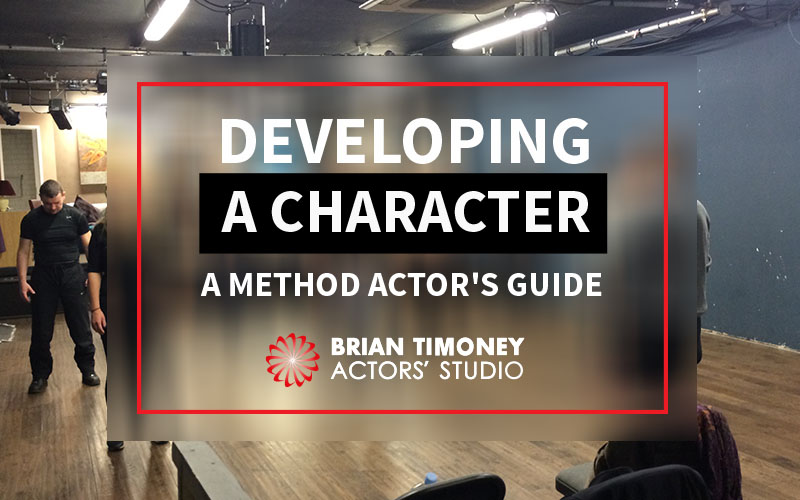Developing a character
So you’ve got the script and a short description of your character to accompany it. You may even have had the chance to speak to the writer and director of the production. You feel like you really understand what they want from the character, and you’ve received all the necessary information from them to help you start working towards that. Now it’s up to you to fulfil their expectations.
Developing a character from a method actor’s point of view is an important and lengthy process, but ultimately one that yields tremendous results. As an actor, your performance will be the presentation to the public of the culmination of everybody’s work around you. No one will see the crew, director, writer or producer and what they brought to the piece as plainly: it is down to the actor(s) to represent the work of the group, and give a performance as true and authentic to the character and production as you can muster.
Getting to know your character
When it comes to creating an authentic portrayal of a character, information is key. Before anything else, you need to gather as much detail as possible about them – regardless of whether they are fictional or based on a real person. Saturation is a simple, but effective method acting technique, which involves saturating yourself with as much information about the character as you have and more. This will allow your unconscious mind to fill in some of the blanks, allowing you to totally immerse yourself in the role and almost ‘become’ your character. It is a technique that Eddie Redmayne famously employed in his Oscar-winning portrayal of Stephen Hawking in The Theory of Everything.
To achieve this, first, you need to collect photos or paintings of your character or some that you may think your character may look like, if they are from fiction or unavailable. Then you need to collect information about their history, the area they live, the clothes they’d wear, things they’d own, etc. When you have as much information about their physical attributes, history, belongings and location, you can begin to enter their mind.
Knowing what you now know about the character, imagine the kind of music they would like, the perfume they would wear, or the books they might enjoy. Then try to live a day as them. Wear their clothes, style your hair in a similar way, visit places they’d go, do things they would do, experience a day at their place of work, if possible. As you do this your unconscious mind will start to fill in the gaps in your character naturally, and you will gain a deeper understanding of them as a result. When it comes the time to perform, it will feel as close to natural as it can to act as this character.
Commitment is key
In the world of method acting, committing to a role is so important, it’s almost assumed. And if you aren’t willing to go over and above what anyone would expect in the pursuit of great character building, then you may as well look for a different acting technique to use. For those remaining, you join the ranks of greats such as Daniel Day-Lewis, Robert De Niro, and the late, great Gene Wilder.
Committing to the role means developing your character and really getting to know them inside out, so when it is time to perform, it will come to you naturally, and shine through on the stage or screen. So what does it mean to ‘commit’?
As Robert De Niro was rumoured to say: “when you wake up, make coffee the way your character would”. In other words, as well as living and experiencing everyday life as your character, you need to work on knowing their personal preferences and mastering their skills and hobbies. So if your character plays the piano – you need to learn how to play the piano or get as close as possible, as De Niro did, obsessively learning how to play the saxophone for his performance in Scorsese’s New York, New York.
Likewise, if your character has an accent different to yours- practice it and use it in your everyday life! Practicing it in the privacy of your own home may be less embarrassing, but it will never come naturally to you if you don’t get out there and use it as if it were your own. Staying in character to order your food at a restaurant, for example, will force you to continue the act, otherwise, you’ll seem pretty strange changing accents half way through. It will surprise you how much you will learn, just by behaving as your character would, truly occupying their skin. Only by fully committing to the role will you fully reap the benefits of this technique.
The Method is the only one you’ll ever need
Once you’ve mastered the Method Acting approach to character development, you will never take on a new role without it: it is an established and proven way to give performances greater than anyone could imagine. From the heartbreaking performance of Adrian Brody in The Pianist to the award-winning roles inhabited by Daniel Day-Lewis – none of them would have been possible without method acting, and it is one of the most established ‘methods’ out there.
If you’re interested in learning more about Method Acting, and if you want to learn all of its valuable secrets, why not consider one of my professional acting courses. I offer a 3 Day Boot Camp to introduce you to The Method, or a 1 year Ultimate Acting Programme, plus a career launch upon its completion.


